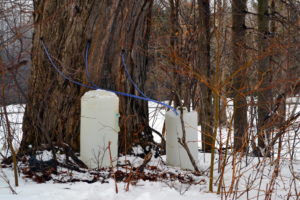When people think of maple syrup, most think of New England or specifically Vermont and with good reason. For a couple hundred or more years, those areas have been producing most of the maple syrup here in the good old USA. However, there’s another state that produces large quantities of some of the best maple syrup you ever poured over a pancake. That state is Pennsylvania. As a matter of fact, Pennsylvania is at least the number six producer of syrup in the US and gaining.

|
2017 Maple Syrup Production in Gallons |
|
|
Connecticut |
20,000 |
|
Maine |
709,000 |
|
Massachusetts |
84,000 |
|
Michigan |
110,000 |
|
Indiana |
12,000 |
|
Minnesota |
14,000 |
|
New Hampshire |
169,000 |
|
New York |
707,000 |
|
Ohio |
80,000 |
|
Pennsylvania |
139,000 |
|
Vermont |
1,980,000 |
|
West Virginia |
9,000 |
|
Wisconsin |
200,000 |
There are more than a dozen maple syrup camps and farms scattered all across the state. One such farm is the Milroy farm at Salisbury, Pennsylvania. The Milroy Farm is near border of Pennsylvania and Maryland at the foot of Mount Davis, the tallest peak in Pennsylvania.
Milroy Farm A Long Time Syrup Producer
The farm has now been family owned and operated for a five generations. Milroy Farms was purchased by Mildred and Roy Blocher in 1942. The farm name originated from combining their first names. Mildred and Roy were the current owners, Jason and Mary Melissa Blocker’s grandparents.
This year, they are placing 14,000 taps in more than 10,000 trees to harvest the sap of the sugar maple tree. It takes about forty gallons of sap to get one gallon of syrup.
Jason told me the farm produces between 3,500 and 4,000 gallons of syrup per season. That means, if my calculator is correct, they collect between 140,000 to 160,000 gallons or more of sap per season. Wow! All in about six to eight weeks.
I asked Jason how many people does it take to accomplish the job. It was certainly a surprise to hear it’s only Jason, his wife Mary Melissa and one other full time employee. However, during the syrup season they do employ six to eight part time people, mostly friends and relatives.
How Do They Keep the Syrup Flowing?
So I asked, how can so few produce that quantity of product? He told me that the days of the little spout driven though the bark with a bucket hanging on, to collect the sap, are pretty much history. Some producers, including the Blockers, still have a few of those mostly for show and a bit of tradition.
Nowadays a tube delivery system and vacuum assist is the method for commercial collection. At the Milroy farm, that translates into 150 to 175 miles of pipe. The system works much like a creek with little tributaries feeding into the main sap stream. Small, 3/4’ lines run to 2” lines that bring the sap to the Sugar House. When the sap reaches the sugar house, the transformation from thin liquid to thick, sugary, delicious syrup begins.
There are natural hazards that can cause breaks in those lines on occasion. Deer, fallen limbs and especially squirrels can break them. In times past, that meant walking the entire assembly and mending those. With 175 miles of lines, that job could take a week or more. Technology has come into play here as in almost every other labor intensive endeavor. The Blockers have a computer controlled monitoring system that tells them instantly when and where a break has happened.
Once the sap has been collected, the first step required to convert sap into syrup is reverse osmosis which removes 75% of the water from the sap. Then it’s into the evaporator, basically a fuel oil fired boiler than further reduces the water content, concentrating the sugar until it reaches 65.7%
PA Maple Festival 2019
Then the syrup is bottled and sold at the farm’s retail outlet and on the internet. They also create delicious maple candies, sugar and spreads. Those are available year round. To learn more about this farm and see and order some or all the maple syrup and maple sugar products they offer, visit their website.
But, to really appreciate this farm and its delicious products make plans to visit during the PA Maple Festival March 30th & 31st and April 4th and 7th.


